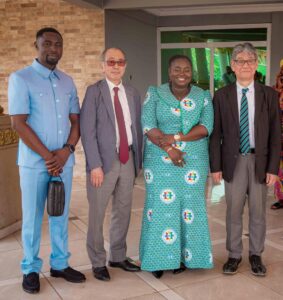 The Ghana Enterprises Agency (GEA) has reaffirmed its commitment to the successful implementation of the 24-hour economy policy by empowering Micro, Small, and Medium Enterprises (MSMEs) with enhanced productivity and efficiency strategies.
The Ghana Enterprises Agency (GEA) has reaffirmed its commitment to the successful implementation of the 24-hour economy policy by empowering Micro, Small, and Medium Enterprises (MSMEs) with enhanced productivity and efficiency strategies.
Through a partnership with the United Nations Industrial Development Organisation (UNIDO), GEA is providing training on the KAIZEN methodology to MSMEs and Business Advocacy Center (BAC) managers. The initiative, funded by the Japanese government, aims to enhance sustainable productivity, eliminate waste, and improve cost management—key components in preparing businesses for a round-the-clock economy.
Margaret Ansei, CEO of GEA, emphasized that the policy would drive job creation, increase exports, and stabilize the economy. She noted that the agency is leveraging technology and business development services to modernize MSMEs, aligning with President John Dramani Mahama’s vision for economic transformation.
She added that the agency has positioned itself well, ready for the implementation of the
24-hour economy policy.
She highlighted the potential of the 24-hour economy, saying the agency through its Business Advocacy Centers (BACs) was supporting and empowering, and providing standardized business development services for Micro, Small and Medium Enterprises (MSMEs) to improve production and packaging to meet international standards for export.
“So, the 24-hour economy comes because if you are doing, you will fill your capacity and you will need more numbers.
“So one job, three people, three shifts and it helps export, promotion, create employment, help the economy to grow and stabilize our currency,” Ms Ansei stated.
She was speaking in an interview with the media on the side-lines of the opening session of a-10
“Kaizen On-the-Job-Training” workshop underway at Dumasua in the Sunyani West
Municipality of the Bono Region.
The United Nations Industrial Development Organisation (UNIDO) is organizing the training being attended by managers of the BACs and some MSMEs in line with the GEA partnerships project tilted “Project for Expanding the Kaizen Initiative by Enhancing Sustainable Agribusiness” It is being implemented by UNIDO with funding from the Japanese government with the focus of Kaizen in sustainable productivity and quality improvements through elimination of waste and efficient cost management.
Ms Ansei said the project implementation fitted the government’s efforts in boosting production through the 24-hour economy and accelerated export development initiatives, saying MSMES development formed a key part in the ‘reset agenda’ of President John Dramani Mahama.
“As we seek to promote, modernize, and accelerate MSMEs development, the strategy will anchor on leveraging on technology and digitalization as a catalyst in the promotion and development of the MSMEs.
“We further seek to provide standardized business development services through a service providers’ certification regime where quality can be guaranteed which is currently lacking in Ghana’s business ecosystem.
“Mediocrity in service delivery cannot lead us to achieve the vision of the 24-hour economy and we are aligning with development partners and private sector on key MSMEs development priorities through effective engagement and mutual adherence to corporate values,” she stated.
The concept of the Kaizen project, Mr Kipo Dari, the National Project Coordinator, UNIDO, explained focused on sustainable operational efficiency with emphasis on productivity and quality enhancement while “promoting workers welfare is a perfect fit for any policy prescriptions aim at boosting production capacity.”
UNIDO Kaizen Expansion Project has
incorporated a digital solution known as UNIDO
Smart Performance Analytics with Real Time Kaizen (U-SPARK) as a tool for sustainable enterprise performance management, he explained.
Mr Dari said he was optimistic that with effective collaboration “we can little by little make significant contributions to the 24-hour policy of President Mahama’s government, your
government, our government by leveraging first on the strengths before looking at the opportunities out there.”
























